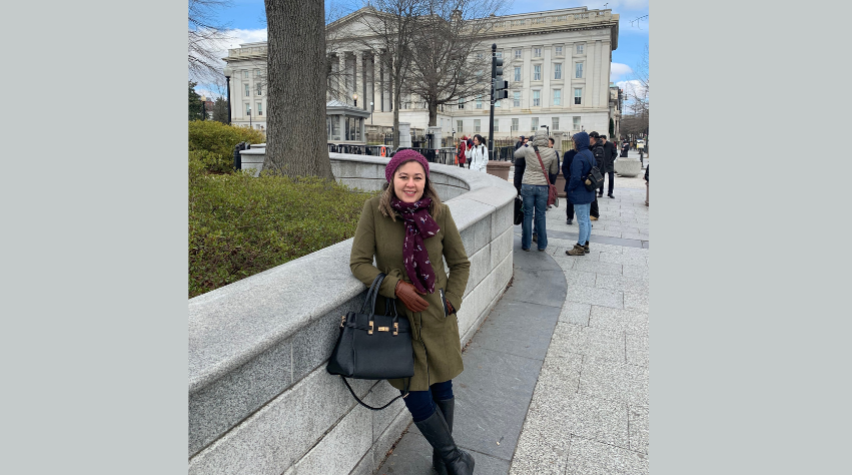
Welcome to the latest in a series of AIChE blog posts profiling process engineers, a diverse group of professionals spanning multiple industries and regions. In this series, we profile process engineers who work in a wide range of fields, including petrochemicals, pharma, bulk chemicals, food, or any process-intensive industry.
Are you a member and process engineer interested in being profiled? We’d love to hear from you via this volunteer opportunity. Please also check out our online discussion group specifically for process engineers. You can find out about these initiatives and join our efforts by visiting https://www.aiche.org/processengineering.
This month, we introduce you to Inès Esma Achouri, who works as an assistant professor in process engineering at the Université de Sherbrooke. She discusses the path that led to her career in process engineering, overcoming challenges, and the importance of her work.
Tell us a bit about your work as a process engineer.
My job as an assistant professor in process engineering consists of doing cutting edge research and teaching future process engineers. I have recently been awarded the title of Canadian research chair holder, to conduct research on process intensification for advanced materials and sustainable energy. Process intensification techniques aim to modify conventional chemical processes into more productive, greener, energy and cost-effective processes.
Why did you become a process engineer?
I have always wanted to be a scientist and was always been good in mathematics and chemical courses. Growing up, I explored several options and decided that as a process engineer, I could discover different fields.
I started my journey as a pharmaceutical engineer then diversified my knowledge by obtaining my master’s degree in biomedical engineering, followed by a PhD in chemical engineering, which further expanded my expertise. I have studied at four universities in three different countries. My intercultural education enriched my scientific training and provided me not only with an experience in a truly international context, but also with a solid national and international network.
...with an engineer father who always pushed me outside of my comfort zone, I decided to choose what I loved, no matter the bias.
What are some of the biggest challenges you face in your role as a process engineer?
Engineering is still viewed as mainly a male field, however, with an engineer father who always pushed me outside of my comfort zone, I decided to choose what I loved, no matter the bias. Later on, I faced other challenges at the intersection of my professional and personal life.
Indeed, I am a mother of two young boys, and I had to prove myself on the same level as any other colleague. As Lesley Evans Ogden put it (University Affairs, November 27, 2019), women who take maternity leaves face a very difficult return to work, which is even more difficult for academic careers in science, technology, and engineering. I was confronted with the reality of those statistics, having taken two maternity leaves, which had a major impact on my career and my productivity.
However, my determination and my tenacity at work allowed me to return to the academic environment, even if there was no Canadian program for assisting returning mothers. I worked very hard by accumulating tasks such as project management with Pfizer, mentoring students, and teaching, while raising two small children. Through this path, I proved my ability to manage important responsibilities comparable to those borne by academic researchers.
How is your work as a process engineer critical to your particular job assignment or industry?
As a research engineer who specializes in process intensification, I mainly work with private companies in order to provide them with new competitive processes or by optimizing their actual processes. Energy efficiency is central to my research strategy, aligned with the world wide strategy for energy transition.
I also work on the design of new materials/processes for specific chemical reactions assisted by alternative energies. For example, one of my recent projects consisted of designing a hybrid reactor that synergistically combined non-thermal plasma with a multifunctional catalyst to produce synthetic fuels.
What do you think is most important about what you do as a process engineer?
Besides developing highly efficient processes, I think that training highly qualified personnel (HQP) is the most important aspect of my work. As a research-engineer in an academic environment, I can offer attractive and exceptional possibilities for students not only to acquire multidisciplinary knowledge (materials design, analysis technologies), but to continue applying this knowledge at the industrial scale.
I train creative and independent HQPs, who will be involved in project definition, experimental design, and data collection, and also in the development of innovative methodologies for process intensification and continuous manufacturing. Students will benefit from my experience in the various fields of process engineering to orient their research project according to their interests.
Connect with Inès on AIChE Engage
Join the Community of Process Engineers
The Community of Process Engineers is brought to you by Scott & Karen Love. Their support enables the AIChE Foundation to advance process engineers at every stage of their career allowing them to Do a World of Good.
AIChE Foundation – Doing a World of Good Campaign



